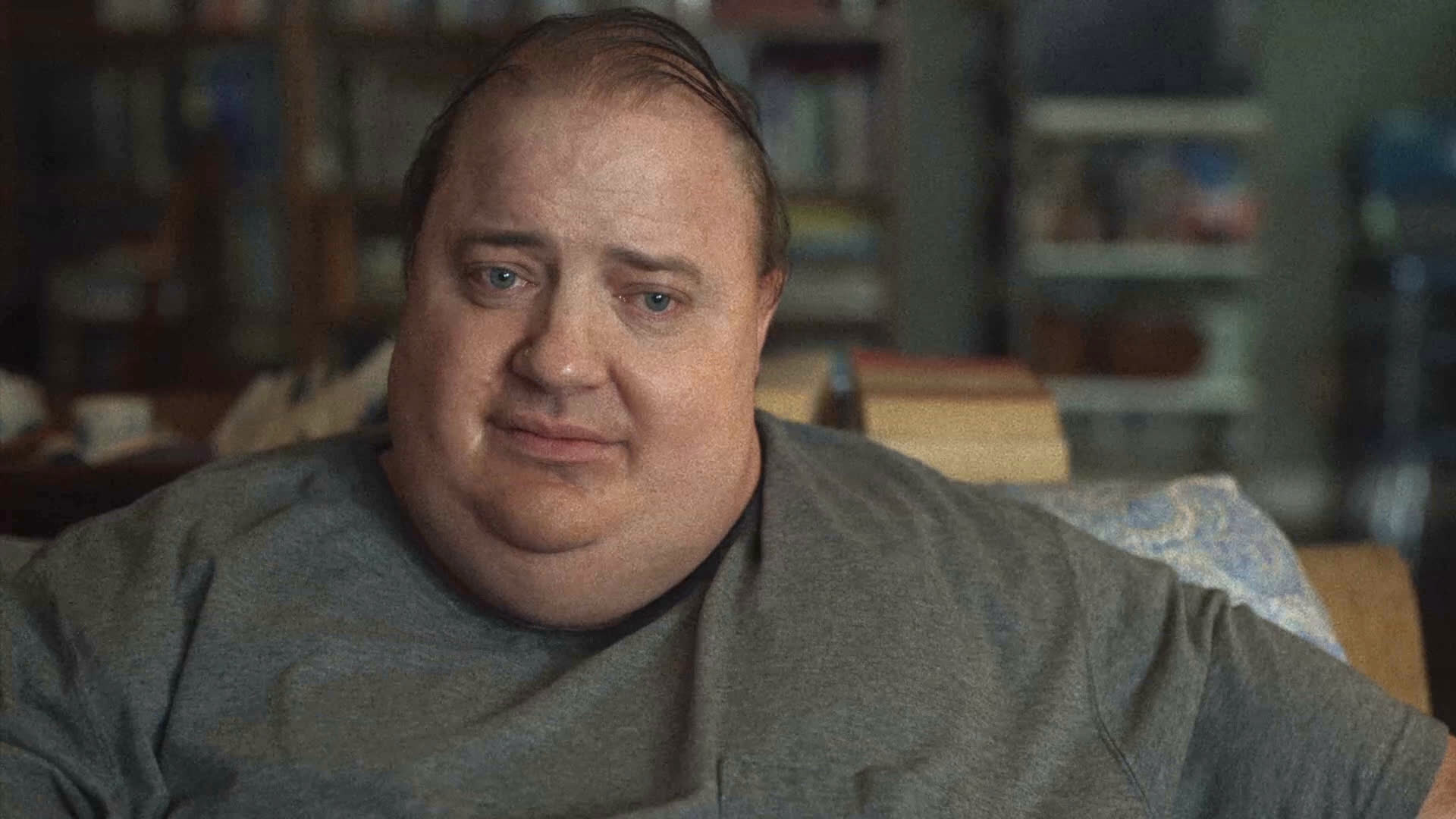It’s been some time since filmmaker Darren Aronofsky has resembled the promise of his early auteur status, cemented by his striking 1998 debut puzzle Pi and peaking more than a decade later (and ago) with 2010’s diabolical Black Swan. Say what you will, but Aronofsky has always been a big swing filmmaker, and one whose exacting visions can be savagely sublime (Requiem for a Dream) or overdetermined (The Fountain, mother!).
His new film, The Whale, about a morbidly obese shut-in suffering through his final days, finds the filmmaker in curiously unshowy form, adapting a single location play by Samuel D. Hunter with far less flair than his reputation would suggest he might. This time, he seems somewhat stifled by the source material, which believes itself to be a compassionate plea for self-acceptance and family reunification. So why does The Whale feel like an artificial slog of unrelenting self-pity featuring some of the most unappealing characters to grace an American film this year?
If you’ve been privy to the buzz coming out of the fall film festivals, Brendan Fraser could be the one to beat for the year’s Oscar, a dubious early claim. In a film bound to be divisive, the actor, whose much discussed real life “comeback” story propels this well-meaning but lackluster exercise, does solid enough work, hitting the predicted emotional beats in a character that is not interesting enough to carry a nearly two-hour exercise in dispirited, insight-free claustrophobia.
His Charlie, a six-hundred-pound Idaho recluse who teaches Gen Z college lit classes over video conference from a cam that he will never turn on for fear of being fat-shamed (a slight narrative mischaracterization of today’s more accepting younger generation), is, apparently, worthy of our interest due to his unfortunate physical predicament. In a screenplay adapted by Hunter from his stage version, the journey of the character, as Dorothy Parker once said, runs the gamut of emotion from A to B. He is isolated and depressed as the film opens and isolated and (perhaps slightly less) depressed in its final scene. Realism? Perhaps. Compelling in this film? Not quite.
Charlie, whom we first meet with his pants down masturbating to gay porn, has serious problems, notably a self-loathing at least the size of his visage. Secondly, his health is in rapid decline according to Liz (an excellent Hong Chau, grounded and sensitive), a caring but exasperated home care health worker. Charlie, whose male partner has died some years prior, has little reason to feel hopeful, shuffling around the often-dark apartment—to the bed, to the refrigerator, to the laptop and to the drawers where he stores dozens of candy bars, which he gorges on along with a pair of pizzas delivered nightly. He’s so ashamed of his size—and the movie goes all in with a massive prosthetic body that is never less than “how’d they do that?” distracting—that he won’t even answer the door for the friendly delivery man outside.
He also nurses a deep regret over abandoning his wife and young daughter years earlier for the male student that became the love of his life, and the opportunity to resolve that parent-child relationship comes a knocking in the form of now seventeen-year-old Ellie (Sadie Sink), as poisonous and off-putting of a character as the movies have seen in ages; she is so selfishly repellent (yes, angry, we get it) that she makes us wish Charlie would show her the door permanently. Instead, she screams at him, makes evil social posts about him roasting in hell, and displays turn-off toxicity each time she is onscreen—it’s a one-note character and performance. The thrust of this relationship is based on Charlie’s guilt and desire to provide his life savings to Ellie (compensatory for his absence, a sort of apology windfall), giving her a cushion as a young adult after a rough start and underachieving academic career.
Another unappealing character, the largely superfluous Christian missionary Thomas (Ty Simpkins) turns up determined to show Charlie the way to deliverance. After witnessing gay porn on Charlie’s television, he hangs around long enough to (wouldn’t you know it) reveal a Secret Past before issuing predictable ultimatum about Charlie’s sexual orientation and salvation.
That’s about all that is going on in The Whale, which thinks it’s a deeply transformational story of a long-lost father and daughter coming to terms. But what is really going on here is disturbing and confusing, the movie encouraging us to gawk in disbelief about the “fat suit” Fraser is wearing (which seems to surround his whole body, including his head), particularly in a naked stroll down a hallway early in the film. Because the effect is so extreme it becomes distracting and feels deployed for shock value. How should we feel about this? Should we take ourselves out of the film and think about Fraser’s “transformation”? Offer sympathy for Charlie’s unfortunate spiral? Cry for him when he reminisces about how he wasn’t always overweight and was, at one point, truly loved? What are we to make of an upsetting sequence involving an eating binge as scary as anything onscreen this year and which, like the film’s fascination with Charlie’s layers of fat, feels like arthouse exploitation?
The Whale is well intentioned, but the film’s argument for genuine empathy is not truly achieved, forcing us to spend time with a character who doesn’t care about himself at all, and is merely waiting to die while refusing assistance. He wants so little in the story that the highly stagy material finds almost no dramatic momentum. At one point, his ex-wife Mary (Samantha Morton, again heavy lifting in a single scene as in She Said) pays a visit for an argument about who most failed young Ellie, and we watch two good actors confront each other, which is enlivening, sure, but not very enlightening.
As filmmaking, The Whale does not transcend its stage origins, though Aronofsky deploys an effectively large musical score by Rob Simonson that often lifts the low-key quality of The Whale to higher emotional stakes, particularly in its final scene. The film comes to life each time Simonson’s music takes the reins.
Underneath the prosthetics, Fraser is tasked with a difficult job, and he creates a character that feels sincere; one wishes the broader physical elements had not been pushed to such extremes. It is easy to imagine him playing the character onstage and dominating the material with immediacy and a suspension of disbelief in a way that he cannot in the film’s close-up artifice. On the positive side, there is an appealing push-pull combat and intimacy between Fraser and Chau, the pair’s connection gradually revealed to be deeper.
Ultimately, people may respond to the character and performance out of pity rather than because Charlie is truly well-written or dimensional—such is the power of what we bring to the screen. The film knows this, and is more than a little manipulative, particularly when a big physical moment of pure hokum occurs at the end.
The Whale finds Aronofsky on a bit of an off day, pushing something along that should have been much more engaging; at a certain point we realize its pain feels performative not authentic. It doesn’t feel like the filmmaker truly believes in what the picture is trying to sell, and I didn’t either—it kept me at arm’s length.
1 1/2 stars



